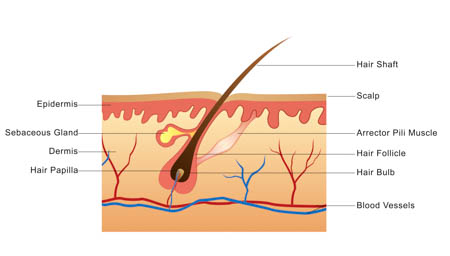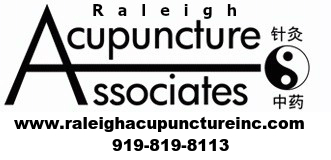
This hair loss case report discusses the treatment of a 34-year-old woman who came to our clinic complaining of significant hair loss after giving birth. Our patient was suffering from a combination of blood deficiency, stress, and lack of sleep. We treated her with acupuncture to address these underlying issues, resulting in marked improvement in hair growth, stress reduction, and sleep quality.
Patient Profile
- Age: 34
- Gender: Female
- Condition: Postpartum hair loss
- Primary Complaints: Thinning hair, increased hair shedding, stress, and poor sleep quality
Medical History
Our patient had recently given birth to her second child. Approximately three months postpartum, she began to notice significant hair loss. Her medical history was unremarkable, with no prior incidents of alopecia or significant health concerns. She reported feeling highly stressed due to the demands of caring for a newborn and experiencing poor sleep, averaging 4-5 hours per night.
Western Medical Explanation for Postpartum Hair Loss
Postpartum hair loss, also known as postpartum alopecia, is a common condition many women experience after giving birth. The primary causes include hormonal changes, where elevated estrogen levels during pregnancy prolong the growing phase of hair, leading to less shedding. After childbirth, estrogen levels drop, causing more hair follicles to enter the resting phase and subsequently shed.
Another cause is telogen effluvium, which occurs when a significant number of hair follicles enter the resting (telogen) phase simultaneously due to physical or emotional stress, with childbirth being a trigger for this type of hair loss. Nutritional deficiencies, such as a lack of iron, zinc, and essential vitamins depleted during pregnancy and breastfeeding, can also contribute to hair loss. Stress associated with childbirth and caring for a newborn can exacerbate hair shedding, while sleep deprivation, common among new mothers, impacts overall health and contributes to hair loss.
Chinese Medicine Hair Loss Diagnosis
Based on the patient’s symptoms and traditional Chinese medicine (TCM) principles, her diagnosis included:
- Liver Blood Deficiency: Manifested as thinning hair and increased hair shedding.
- Stress (Liver Qi Stagnation): High stress levels contributing to hair loss and sleep disturbances.
- Sleep Deprivation: Poor sleep quality affecting overall health and hair regeneration.
How Acupuncture Addresses Hair Loss
Nourishing Blood Circulation
As you will learn in this hair loss case report, acupuncture employs specific techniques to address hair loss. In the context of nourishing blood circulation to the scalp for hair growth, acupuncture utilizes fine needles inserted at strategic points along meridians associated with blood flow. These points include Sanyinjiao (SP6), Zusanli (ST36), and Ququan (LV8), among others. By stimulating these points, acupuncture enhances blood circulation throughout the body, including the scalp. Improved blood flow delivers oxygen, nutrients, and hormonal regulators to hair follicles, promoting their health and stimulating hair growth. This process helps combat conditions like blood deficiency, often implicated in hair loss, thereby supporting natural hair regeneration.
Stress Reduction
For stress reduction, acupuncture works by promoting the circulation of qi (vital energy) through meridians. Stress often disrupts the smooth flow of qi, leading to physical and emotional imbalances. Acupuncture points such as Taichong (LV3), Neiguan (PC6), and Baihui (GV20) are commonly used to regulate the flow of qi and relieve stress. By inserting needles at these points, acupuncture stimulates the release of endorphins and other neurotransmitters that induce relaxation and reduce the physiological markers of stress, such as elevated cortisol levels.
Promoting Sleep
Furthermore, acupuncture can promote better sleep by calming the mind and addressing underlying imbalances that affect sleep quality. Points like Anmian (an extra point for insomnia), Yintang (an extra point for calming the mind), and Taixi (KD3) are often utilized to improve sleep patterns. Acupuncture enhances the production of serotonin and melatonin, neurotransmitters crucial for regulating sleep-wake cycles. By restoring balance within the body’s energy pathways and promoting relaxation, acupuncture helps alleviate insomnia and encourages deeper, more restorative sleep.
Overall, this hair loss case report demonstrates acupuncture’s ability to nourish blood circulation, reduce stress through qi regulation, and promote sleep by calming the mind. These factors highlight its holistic approach to treating conditions such as hair loss in conjunction with addressing broader health concerns.
Hair Loss Treatment Plan
Our treatment plan in this hair loss case report focused on addressing blood deficiency, reducing stress, and improving sleep quality. The patient received weekly acupuncture sessions for a period of three months.
We used the following acupuncture points:
Blood Deficiency Acupoints
- SP6 (Sanyinjiao)
- ST36 (Zusanli)
- LV8 (Ququan)
Stress Reduction Acupoints
- LV3 (Taichong)
- PC6 (Neiguan)
- GV20 (Baihui)
Sleep Improvement Acupoints
- Anmian (Extra Point)
- Yintang (Extra Point)
- KD3 (Taixi)
Hair Loss Case Report Progress and Outcomes
First Month: The patient reported slight improvement in sleep quality and a reduction in stress levels. Hair loss continued but at a slower rate.
Second Month: Noticeable reduction in hair shedding. The patient experienced significant improvement in sleep, averaging 6-7 hours per night. Stress levels were further reduced.
Third Month: Hair growth was observed, with new hair becoming visible in areas that had thinned. The patient reported feeling more relaxed and sleeping better consistently.
Conclusion
This hair loss case report demonstrates the efficacy of acupuncture in treating postpartum hair loss attributed to blood deficiency, stress, and sleep deprivation. By addressing these underlying issues, acupuncture facilitated hair regeneration, reduced stress, and improved sleep quality. While not all forms of hair loss can be effectively treated with acupuncture, cases involving similar etiologies may respond well to this holistic approach.
Next Steps
BOOK NOW to schedule an appointment online.
Watch video about our Hair Loss treatment.
Learn about all the conditions we treat.
Focus Keyphrase: Hair Loss Case Report
Image generated with https://perchance.org/ai-text-to-image-generator
A 2015 hair loss acupuncture research study concluded that acupuncture combined with the Chinese herbal formula Huo Xue Sheng Fa was safe and effective for resolving alopecia areata. This condition is a form of hair loss usually presenting as round bald patches. Plum blossom, 7-star needle technique was applied to the skin to promote hair growth.

In this hair loss acupuncture research, 62 patients with alopecia were randomly placed into a treatment and control group. The treatment group was treated with acupuncture and herbs. The control group received acupuncture combined with licorice tablets.
Study Participants
The 31 participants in the treatment group included 16 male and 15 female patients, 18 to 40 years old, with an average symptom duration of 7.5 months. The control group had 16 male and 15 female patients ranging from 18 to 37 years old, with an average symptom duration of 7 months.
All Participants Had The Following:
Sudden, rapid hair loss.
Hair loss areas primarily round or oval shaped.
Widespread alopecia patches.
Symptoms discovered inadvertently.
Affected areas had no obvious symptoms of organic disease.
Mental stress, persistent worrying, insomnia, forgetfulness.
Positive hair pull test result.
People Were Excluded From Study If They Had:
Hair loss due to infection.
Serious nerve or mental illness.
Tendency to bleed.
Blood clotting problems.
Treatment Methods
Both groups received 7-star (plum blossom) acupuncture twice a week at hair loss areas, moving from the outer edge of each alopecia patch towards the center, in a clockwise direction. Acupuncture was applied lightly, rapidly, and accurately until flushing appeared.
The treatment group patients took the Chinese herbal formula Huoxue Shengfa 3 times a day, 200 ml each time. The ingredients of the formula included:
Dang Gui 30g
Dan Shen 30g
Yu Jin 15g
Ling Xiao Hua 15g
Bai Shao 10g
Tian Ma 10g
He Shou Wu 15g
Wu Shao She 10g
Gan Cao 9g
The control group patients took licorice tablets (also known as Shuai Neng) after their meals 3 times a day, 75 mg each dosage. The treatment period lasted 4 weeks. Results were observed and recorded 12 weeks after 3 rounds of treatment were given to both groups.
Test Results
Researchers stated that the total recovery rate for the treatment group was 90.32% with a recurrence rate of 9.68%. The total recovery rate for the control group was 67.74% with a recurrence rate of 32.36%. Also, 1 case of an adverse reaction, mild dizziness, was observed in the treatment group.
A total of 5 minor adverse reactions occurred in the control group. Both groups obtained an adverse reaction rate of 3.23% and 19.35% respectively. All adverse symptoms were minor and disappeared after the patients were treated accordingly.

Acupuncture Background
Alopecia areata has been treated with acupuncture and Chinese herbs since the ancient Warring States Period in China. Ancient medical scholars concluded that the best treatment for alopecia was to address blood stasis and promote qi and blood circulation. This prompts the body to supply essential nutrients to the hair. The Huoxue Shengfa decoction was originally prescribed by Cheng Ganlu, where Dang Gui and Dan Shen were used for their powerful blood circulating properties.
Modern researchers have found that Dang Gui helps strengthen the immune system and promote haemopoiesis, the production of blood cells and platelets in the bone marrow.. Dang Gui has also been shown to regulate blood platelet aggregation and benefits blood circulation. Dan Shen promotes blood circulation and repairs tissues. All other ingredients mentioned in the prescription are used to complement and assist one another to create the best treatment outcome.
Acupuncture Best Treatment For Alopecia
The researchers noted that acupuncture was one of the most important treatment methods in Traditional Chinese Medicine for alopecia areata. This hair loss acupuncture research conclusively demonstrated that acupuncture promotes blood circulation, especially to the skin.
When blood flow increases in the skin, nutrients in the skin are replenished, which encourages hair growth. Additional research demonstrates that acupuncture regulates the neuroendocrine system and benefits the immune system. The researchers concluded that acupuncture was safe and effective for the treatment of alopecia areata when it was combined with the Chinese herbal formula Huoxue Shengfa

Next Steps
If you have hair loss or have been diagnosed with alopecia, try acupuncture. It is safe, natural and is very effective for restoring hair growth.
BOOK NOW to schedule an appointment online.
WATCH VIDEO ABOUT OUR HAIR REJUVENATION TREATMENT.
LEARN ABOUT ALL THE CONDITIONS WE TREAT.
Hair Loss Acupuncture Research
If this hair loss acupuncture research prompted your interest, give us a call. We’d be happy to discuss our hair loss treatment.
Reference
Cheng Ganlu, Clinical effects of acupuncture plus the Huoxue Shengfa decoction on alopecia areata, Clinical Journal of Chinese Medicine, 2015(13).
A 53 year old woman came to our office complaining of hair loss. In addition, she was suffering from joint pain, fatigue and insomnia. All of these symptoms were related to two medical conditions, lupus and menopause syndrome. This hair loss acupuncture case study describes how we were able to promote hair growth in addition to helping with her other lupus and menopause-related symptoms.

Hair Loss – A Common Menopause Symptom
Healthline.com states that, “Research suggests that hair loss during menopause is the result of a hormonal imbalance. Specifically, it’s related to a lowered production of estrogen and progesterone. For women going through menopause, the cause of hair loss is almost always related to hormonal changes.”
At Raleigh Acupuncture we see this condition all the time in our menopausal patients. In addition, concurrent symptoms often include difficulty sleeping, irritability, dryness and foggy brain. Acupuncture helps the body adjust to the new hormone levels associated with menopause. Returning the body to balance naturally promotes hair growth, while also improving sleep, mood and brain function.
Hair Loss and Lupus
Lupus.org states, “A lupus diagnosis often brings many physical changes, including hair loss. If there is too much damage to the skin, the hair may not be able to regrow. Hair loss associated with discoid lesions and scarring is generally permanent, so early treatment is key.”
Again, the Chinese medicine practitioners at Raleigh Acupuncture have been treating patients with lupus for over 15 years. This autoimmune condition responds favorably to acupuncture because treatment boosts and restores balance to the immune system. Symptoms like joint pain, fatigue and hair loss are reduced dramatically.
Hair Loss Acupuncture Case Study
In this case study, our patient was at her wits end. Poor sleep, joint pain and foggy brain were making it very difficult to function. Her medications for lupus were helping slow the progression of the disease, but these side effects were deteriorating her quality of life. Hair loss in round patches on her scalp was the final straw – she had to get relief.
Chinese Medicine Diagnosis
Alopecia (hair loss) is most often understood in Chinese medicine to be a condition of blood deficiency. Women going through menopause will often have thinning hair. Lupus adds the indignity of losing hair in round patches (discoid lesions).
Our diagnosis for her hair loss therefore was blood deficiency, which we treated with acupuncture and Chinese herbs. Acupuncture points included SP6, ST36, SP10, LV3 and LV8 on the front of the body, in addition to local points on the scalp. Chinese herbs were given to increase blood production and circulation, specifically to promote hair growth.
Other points were used to help with her sleep issues, joint pain and foggy brain. Her treatment was designed to address all of her symptoms, not just the hair loss. Many times a person’s symptoms will have overlapping root causes. That was the case with this patient.

Excellent Results
Our patient’s bald patches slowly filled in over the course of 10 treatments. Points on the body worked at the organ level for her body to build more blood. Local points on the scalp stimulated blood circulation in the area of the lesions, prompting hair growth. The combination of treating the root and branch delivered excellent results.
These 10 treatments also allowed us to address her other symptoms. These were all treated at the organ level. Insomnia and foggy brain improve with building qi and blood. Joint pain eases with improved qi and blood circulation. Our patient was motivated to come for acupuncture due to her hair loss, but ended up benefiting in other ways. Balance restores health across the boards.
Next Steps for Hair Loss
Try acupuncture to resolve hair loss. It’s a natural, safe solution that improves hair quality while restoring balance and health to your body.
BOOK NOW to schedule an appointment online.
WATCH VIDEO ABOUT OUR HAIR LOSS TREATMENT.
LEARN ABOUT ALL THE CONDITIONS WE TREAT.
Alopecia Improved With Acupuncture
To learn more about our hair loss treatment, give us a call. We’ll be happy to discuss the process with you.
It is common for women to go through times when they lose significant amounts of hair. Triggers include perimenopause, postpartum (after giving birth), high stress, and working too hard with insufficient sleep. The Raleigh Acupuncture hair loss treatment restores hair growth, balances your body, and restores health.
Raleigh Acupuncture Hair Loss Treatment
Watch this video to learn more about our hair loss treatment.
How It Works
Hair loss is one of the ways our body tells us we’re pushing too hard. Hair loss indicates a lack of Qi (energy) and blood in Chinese medicine. When we exert ourselves, we use a more significant amount of resources. If we don’t get enough sleep, we cannot restore these resources and become depleted. Hair loss is a prime example of this depletion.
Acupuncture and Chinese herbal medicine boost your body’s ability to generate Qi and blood, giving you more resources to function well. As a result, this natural medicine enables the body to restore hair health and growth. Therefore, we must address your entire body’s health when treating hair loss. Only by restoring your health can we rejuvenate your hair growth.

What To Expect
All needles are sterile, single-use, and hair-thin. The treatments are relaxing – many of our patients fall asleep during their sessions. Acupuncture restores your health while you rest. Afterward, you will feel refreshed and rejuvenated.
We conduct an intake exam when you come for your first Raleigh Acupuncture hair loss treatment. This assessment determines your Chinese medicine pattern diagnosis. Once we understand the specific reasons for your hair loss, we create a treatment plan that includes acupuncture and Chinese herbs. You will receive your first treatment that same day.
Hair Loss Acupuncture Case
We recently had a woman come to our clinic frustrated with the amount of hair she lost. She had given birth six months earlier and was currently still breastfeeding. We explained that giving birth and breastfeeding depleted her blood – and healthy hair growth depended on sufficient blood.
Our treatment focused on replenishing the blood loss that had occurred during delivery and nursing. In addition, we encouraged her to eat red meat, as this food helps build blood. As a result, within six treatments, she stopped losing hair. Three months later, once she had ceased breastfeeding, we treated her another six times with acupuncture and Chinese herbs, after which normal hair growth was restored.
Next Steps
BOOK NOW to schedule an appointment online.
Watch Video About Our Hair Loss Treatment.
Learn about all the conditions we treat.
Research and Case Studies
Hair Loss Acupuncture Research Study.
Hair Loss Acupuncture Case Study.
Focus Keyphrase: Raleigh Acupuncture Hair Loss Treatment
What our Clients are Saying
I came to Raleigh Acupuncture for another condition. While they were treating me I mentioned my struggle with hair loss. I had been losing hair ever since giving birth to my last child. I was amazed after they started treating me for hair loss that my hair starting growing back. It totally worked. The patches filled in and my hair got more full all over. Thank you Raleigh Acupuncture. My hair thanks you!

